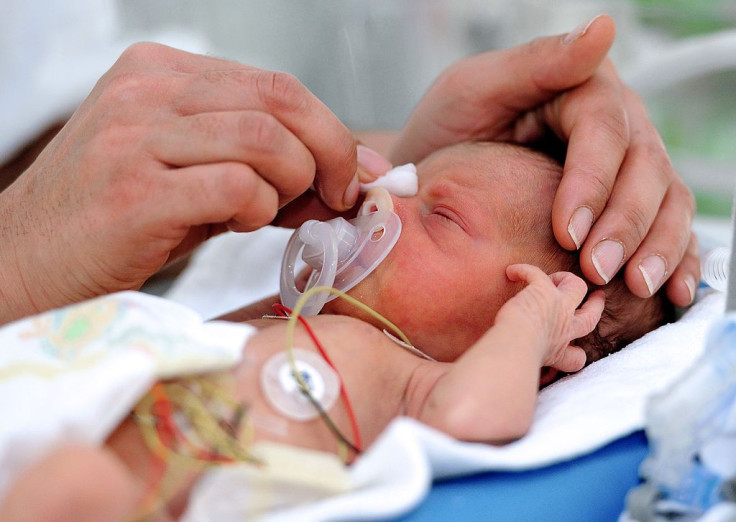Steroid Treatment May Prevent Brain Hemorrhage In Preemie Babies Born Up To 24 Weeks Early

No parent wants to hear the news that their unborn child will be delivered prematurely, but this is a reality for one in 10 babies born in the United States and 15 million babies born worldwide. One of the most devastating possible side effects of being born before 37 completed weeks of gestation is intraventricular hemorrhages (IVH), or bleeding of the brain. New research shows that there is a way to lower the risk of hemorrhaging in babies born as early as 22 weeks gestation by giving their mothers a prenatal steroid shot before labor.
Scientists knew the shot would benefit babies born later on, but finding that it could improve medical outcomes for the most fragile babies — those born at just five months pregnancy — would be a major step forward in neonatal medicine.
Today, the survival outlook for preterm babies is better than it has ever been before, and, thanks to technological and medical advances, it is improving every day. Lead researcher Dr. Henry Lee told Medical Daily, however, that as we’ve gotten better at helping premature babies survive, he began to realize it isn't the only goal — we also want these babies to have long happy lives.
Lee said IVH is one of the most worrying complications of preterm birth because can lead to to neurological and developmental difficulties or delays, or even death. “We wanted to examine ways to prevent this, ” Lee explained.
According to the study, past research has suggested steroids provided to mothers to strengthen their unborn preterm babies' lungs may have the added effect of protecting the babies' brains from hemorrhaging. To further support this observation, a team of researchers from Stanford University Medical Center analyzed the birth results of nearly 26,000 premature infants.
The team collected their data from the California Perinatal Quality Care Collaborative, and looked only at information on infants born between 2007 and 2013. Although all preterm babies are at some risk for IVH, a condition characterized by bleeding in the fluid-filled areas (ventricles) of the brain, it's the most preterm babies, whose brains had the least amount of time to fully develop, that face the highest risk. Infants involved in the study arrived between 22 and 32 weeks of pregnancy, and weighed less than 3.3 pounds. Among the infants included in the study, 87 percent were born to mothers who received steroid treatment in anticipation of their premature delivery.
Steroids are often given in the form of a shot to mothers who are in preterm labor or already known that they will deliver early. Lee said there is an optimal time to administer this; about a day or two before the baby is born, which ensures the drugs are most effective.
In a group of close to 26,000 infants, about a quarter suffered from some type of IVH, and 7 percent had severe brain bleeding. However, results from the analysis revealed that the risk of all types of intraventricular hemorrhages was one-third lower in babies whose mothers received prenatal steroids, when compared to mothers who didn't receive any steroids. In addition, the risk for the most severe forms of IVH were halved, a result most significant in babies born between 22 and 29 weeks of pregnancy — an age group once thought to be too young to benefit from the treatment.
The reason for the steroids’ effect on IVH risk is not clear yet, but the team has a hypothesis.
"We speculate that steroids may accelerate the maturation of blood vessels in the brain and make them stronger," Lee said in a recent statement. "That may make the baby less vulnerable to rapid shifts in blood pressure, which could otherwise cause bleeding similar to a stroke."
While the results are exciting, as they suggest that there is more hope for a group once considered beyond medical help, Lee explained that there is one caveat.
“Many premature infants born this young actually don’t survive,” Lee said. Often, in cases of extreme premature births, the risks of not just survival but also long-term complications are so great that families may choose to forgo steroid treatment. “It is a very complex situation that requires careful individualized counseling for the families to determine if we are even going to try and help the babies survive.”
Source: Wei JC, Catalano R, Profit J, Gould J, Lee HC. Impact of antenatal steroids on intraventricular hemorrhage in very-low-birth weight infants. Journal of Perinatology. 2016
Published by Medicaldaily.com



























